Djibouti, legitimately the Republic of Djibouti, is a country located in Africa which is bordered by Eritrea in the north, Ethiopia in the west and south, and Somalia in the southeast. The rest of the border is covered by the Red Sea and the Gulf of Aden at the east.
It enjoys a miscellaneous economic system in which the economy has private freedom, collective with centralized economic planning and government regulation. The country is a member of the African Union (AU), African Economic Community (AEC) and the Common Market for Eastern and Southern Africa (COMESA). Djibouti, though tiniest is the most talented or the most resourceful. Djibouti stands out as an anchorage of firmness and objectivity.
ECONOMIC PROFILE
Djibouti’s economy is based on service activities connected with the country’s strategic location and status as a free trade zone in the Horn of Africa. Djibouti provides services as both a transit port for the region and an international transshipment and refueling center. Imports, exports, and re-exports – primarily of coffee from landlocked neighbor Ethiopia – represent 70% of port activity at Djibouti’s container terminal. Djibouti has few natural resources and little industry. The nation is, therefore, heavily dependent on foreign assistance to help support its balance of payments and to finance development project. Djibouti in 2012 began construction of a third port to secure its position as a critical transshipment hub in the Horn of Africa and the principal conduit for Ethiopia’s trade.
Djibouti also received funding in late 2012 for a desalination plant to begin address the severe freshwater shortage affecting Djibouti City, and particularly its poorest residents. It is a major port for NE Africa for global transshipment and refilling center. The main exports are hides and skins, cattle, and coffee. Foods and beverages, transportation equipment, chemicals, and petroleum products are imported in the country. The foremost interchange partners are Somalia, Ethiopia, Saudi Arabia, India, and China. The economy depends heavily on the service area, which contributes almost four-fifths of the country’s Gross Domestic Product.
OPPORTUNITIES TO INVEST
Due to its geo-strategic location, it has become transport and shipping hub for the provincial neighbors and controls access to the Red Sea and Indian Ocean. FDI has worked as a catalyst in the country’s economic growth which is presently revolving around 4.5% and is expected to reach an average of 5.8% till 2017. Djibouti offers plenty of opportunities in the Port Development and Agri-logistics sectors and is the principal port for imports to and exports from neighboring Ethiopia.
Through an investor’s perspective, Djibouti is a young country which is full of opportunities where investors can invest. The prime sectors are:
Real Estate
Djibouti, a country with unemployment rate above 50% in urban areas, has a population of 800,000. The foreign military company provides a major share of the consumer spending. The Chinese, the Somalis, and the Americans are the biggest purchasers of the new villas according to the statistics. Chinese financiers and contractors are slowly coming in numbers as interest from the China Africa Development (CAD) Fund grows predominantly around the prospective of logistics, energy and tourism.
Tourism
Djibouti is a welcoming city for the visitors. Locals usually speak French, Arabic and/or Somali with some locals economically speaking English. The country is also home to internationally well-known scuba diving places in the north. Unfounded and founded refuge concerns have kept the tourism sector from growing. A heavy boost can be experienced in the tourism sector by investing in moderately priced, quality hotels as well as other touristic facilities (i.e., tour guides, moderately priced restaurants, etc.).
Logistics and Warehousing
The Djiboutian ports are vigorous to Ethiopia and is now growing its importance to South Sudan. Warehousing and transports are overpriced that it is better to dump them out after six months than to store them. During the winter season (right after the Ethiopian rainy season), the port is further jammed due to a major crash in imports and exports. The port blockage will only be calmed through development of the other ports, more reasonable warehousing, and, in the longer term, better transnational interaction over taxes and duties among other things.
Education
Djibouti, a place with very small population has more than 60% of its population working. The Université de Djibouti, inaugurated in 2006, is the only college-level education benefactor in Djibouti. Today also those who have enough money it still leave the country for education. In such a young economy, there is a countless need for practical abilities resulting from management institutes and vocational preparatory schools. The schools can help develop local skills, especially entrepreneurial related skills, essential to enlarge an economy reliant on foreign backing and imports.
Livestock
Livestock remains the main commotion in the rural world which is done in two ways: nomadic and sedentary. About 90% of upbringing is nomadic, the rest is sedentary. Breeding also signifies a sturdy element of financial addition as soon as it goes beyond the stage of modest feeding. Djibouti owns an important livestock and due to its strategic position, its assets plays a major role of regional trade in cattle. The possibility of the sector of breeding is high and full of animal resources, but it demands modern technology and foreign investment in revolution activities like modern glacier massacre houses for export.
Fishing
With 372 km of shoreline, the area of mainland ledge Djibouti broken by fisheries is about 2,276 km2. Despite the potential fish with sustainable levels of misuse are estimated at 9,300 tons for demersal fish and large aquatic fish and 22,000 tons for small aquatic domestic production varies between 1,600 and 1,900 tons of yearly moorings. Currently, the fisheries sector provides permanent engagement of 3 600 persons.




